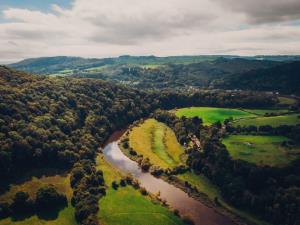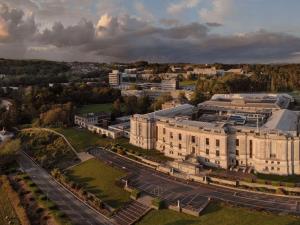If Welsh can seem complex and beautiful, it’s because it’s spent 4,000 years evolving. What’s certain is that it’s Britain’s oldest language. From Indo-European and Brythonic origins, the Romans were the first to commit these words to paper, introducing elements of Latin still present today.
Historians see clues in the prose of the earliest Welsh poets, writing between the fifth and eighth centuries. They pinpoint Early Welsh, Breton and Cornish as being related.
The Welsh language
Offa’s Dyke was the first clear border between the English speakers of the east and the Welsh speakers of the west. Wales was one of the first countries to use its own language to create laws, and the word Cymry was used to describe its people as long ago as the seventh century.
For the oldest existing set of Welsh tales from the medieval period, pay a visit to the National Library of Wales in Aberystwyth – coincidentally the home of the first private Welsh language school, in 1939 – for a look at 14th century tome the White Book of Rhydderch.
Norman invaders brought French to the valleys, and their British followers introduced English. In 1536, Henry VIII decided to pass the Act of Union, prohibiting the use of Welsh in public administration and the legal system. You can imagine Owain Glyndŵr, who had instigated a revolt at the start of the 15th century, turning in his grave against the ruling.
Then there was the Act of Uniformity of 1549, which demanded all acts of public worship be conducted in English, and the somewhat contradictory legislation of Elizabeth I, who wanted churches to carry Welsh versions of the Book of Common Prayer and the Bible.
The first book in Welsh was published around this time, and perhaps the peak of the wonderful poetry we know Wales for came in 1792, when Iolo Morganwg established the Gorsedd of the Bards, a protective alliance who played an important part in the rise of the Eisteddfod festivals.
The Industrial Revolution and World Wars perhaps accelerated the decline of the language, not helped by the infamous Welsh Not – signs hung around the necks of schoolchildren who dared speak Welsh during the 19th century.


Modern Wales
Now more than a quarter of the population of modern Cymru can speak or use Welsh. This figure increases among children, helped by two major education acts passed during the 1900s. You’ll hear and see plenty of Welsh – Radio Cymru launched in 1977, and the television channel, S4C, began in 1982. There are also plenty of newspapers, regional radio stations and road signs in both English and Welsh.
Welsh language music is celebrated and thriving across all genres today, and we even have a special day dedicated to enjoying it. Dydd Miwsig Cymru, or Welsh Language Music Day takes place in early February each year, and you can find gigs and happenings going on all over the country. If you've missed the day, don't worry - Welsh language music can (and should!) be enjoyed all year round, and there are a number of Welsh language Spotify playlists for your listening pleasure. Here's our man Huw Stephens to explain a little more about the day...
Easy Welsh phrases
And the phrases you should look out for? Hello is the easily-remembered ‘helo’ and thank you is simply ‘diolch’. Here are some more simple words and phrases to get you started:
Bore da (Pronounced: Boh-reh dah): Good morning
Prynhawn da (Prin-houn dah): Good afternoon
Nos da (nohs dah): Good night
Croeso i Gymru (Croesoh ee Gum-reeh): Welcome to Wales
Iechyd da! (Yeh-chid dah): Good health! (Cheers!)
Tafarn (Tav-arn): Pub
Diolch (Dee-olch): Thanks
Da iawn (Dah ee-aw-n): Very good
A postcard home, all being well, might also contain the phrase ‘mae'n heulog’ – it’s sunny.







